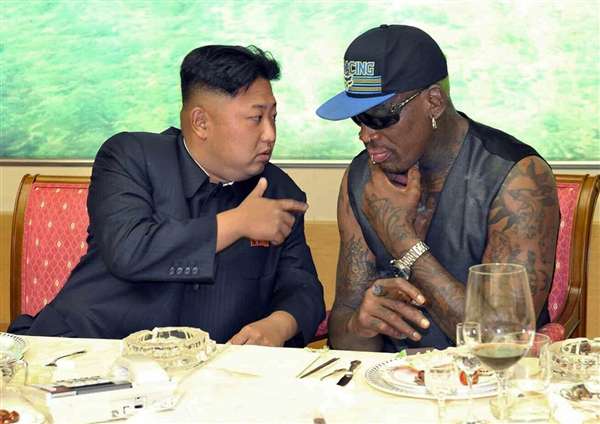“Republicans buy shoes too.” Those words came from the mouth of one Michael Jeffrey Jordan, after he declined to endorse a black Democratic candidate for a North Carolina Senatorial election in 1990. More recently, Jordan’s one-time Chicago Bulls teammate Dennis Rodman made headlines following his third visit to North Korea to promote Basketball Diplomacy with Supreme Leader Kim Jong-un. Jordan refused to use his enormous cache as a popular athlete to take a political stance because he wanted to ensure greater sales of his sneakers. Rodman, who has unprecedented access and influence over Kim, did not wish to bring up the starvation or labour camps that exist in the authoritarian regime, citing his friendship with the ruler. In both cases the athletes erred. Despite the fact that both Jordan and Rodman have and undoubtedly should have the right to stay above the political fray, athletes have a platform to affect change and should use that ability to influence society for the better.
A common fear that arises with professional sports franchises is that athletes who choose to express their views will create distractions from the team and suffer a drop in performance by overtly speaking their mind. Chris Kluwe, a former NFL punter, alleged that he was released because of his activism—not from an inability to do his job which his former team, the Minnesota Vikings allege. Kluwe was not infringing upon any of his teammates or playing poorly. Rather, he was simply using the platform he had to bring about positive social change.
As the late Nelson Mandela once said, “sport has the power to change the world.” Then Springboks rugby captain François Pienaar showed the leadership to join with Mandela and unite a nation divided by a legacy of apartheid. Pienaar believed that athletes have a responsibility, and he utilized his influence without being a distraction. In some cases, words don’t have to be used. Following the 200m sprint final at the 1968 Olympic Games in Mexico City, John Carlos and Tommie Smith raised their arms in unison as a form of protest during the civil rights movements. The backlash was fierce for both, who were booed while leaving the podium, yet the impact they had with that simple gesture was to bring awareness to a very important and contentious issue at the time.
By virtue of their success and widespread coverage, athletes are given a gift. Simply put, when athletes talk, people listen. When they act, people watch and then follow. Yes, an athlete’s primary focus should be on honing their craft and attempting to achieve success on the field or on the court. But athletes are also role models to millions of children who grow up wishing to be just like their favourite player. Heck, they are even role models to adults who would do anything for their team. If professional athletes are able to raise awareness on topics or exert influence to better society should they not do so, and in turn, encourage the rest of us to speak our mind and fight for what’s better?
Dennis Rodman was entitled to his choice when he refused to bring up North Korea’s problems with its leader just as Carlos and Smith were entitled to theirs. Carlos and Smith had the courage to stand up and speak up, something that hopefully more athletes, given their gift, will do too.









